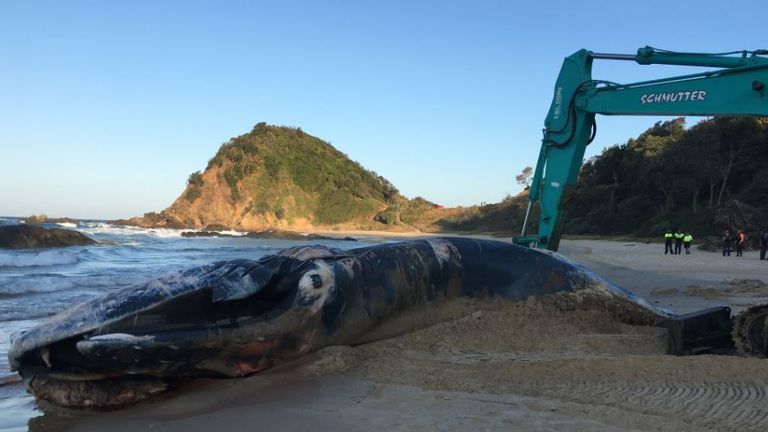Great white shark sightings force council to cut up humpback whale carcass
After the 40-foot long humpback whale beached on a popular holiday spot 21 great white shark movements were detected nearby.
Monday 25 September 2017 09:57, UK
An 18-ton whale carcass is being exhumed, cut up and moved after it attracted sharks to a popular Australian beach.
The 40-foot long humpback whale came ashore at Nobbys Beach in Port Macquarie, New South Wales, after becoming entangled in fishing ropes on 17 September.
Efforts to drag it back to sea were abandoned after it became caught on rocks and died, after which authorities dug a hole to bury it on the beach.
However, thousands of locals signed a petition to have the carcass exhumed after it attracted a number of sharks to the beach - causing the holiday spot to be closed for safety reasons.
In the days after it beached 21 great white shark movements were detected nearby, Port Macquarie marine rescue senior skipper Geoff Shelton said.
The dead mammal, which also sent oil and decaying blubber seeping into the ocean, is now being removed by workers with a digger truck.
"We are using an excavator with big teeth on its bucket to actually cut the whale in pieces," Port Macquarie-Hastings Council environmental director Matt Rogers said.
"There are overseas experiences where whales have been taken off beaches... but nothing like we're seeing here with skip bins being winched up an escarpment, a crane reaching out 60 metres."
Council general manager Craig Swift-McNair thanked contractors for carrying out the "hard and smelly work", adding: "Our aim is to get the whale off the beach in the most efficient and safe manner".
The humpback whale is believed to have travelled from as far away as Tasmania and died as a result of exhaustion.




